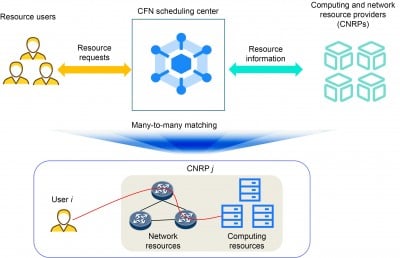Researchers from China Mobile published a research paper in Frontiers of Information Technology & Electronic Engineering 2024, Vol. 25, No. 5. The paper first adopts a reputation model based on the beta distribution function to measure the credibility of computing and network resource providers (CNRPs) and proposes a performance-based reputation update model . Secondly, it formalizes the problem into a constrained multi-objective optimization problem and uses a modified fast and elitist non-dominated sorting genetic algorithm (NSGA-II) to find feasible solutions, providing flexibility for matching decisions between users and resource providers.
In the industry, several approaches and methodologies have been proposed for optimization scheduling in computing and network convergence, focusing on modeling and solving resource scheduling optimization problems in the multi-cloud model through multi-dimensional resource constraints . At present, there are some studies on multi-objective optimization in the industry; reputation systems have also been widely studied in multiple domains, and beta distribution is often used in reputation modeling, but there are few studies on reputation-based scheduling in computing force networks (CFNs).
The reputation-based joint optimization framework is applied to a many-to-many system, where the CFN scheduling center connects users and CNRPs. A reputation model is introduced to evaluate the performance reliability of CNRPs, and a comprehensive evaluation model based on performance and reputation is constructed. The scheduling decision process is formulated as a constrained multi-objective optimization problem to optimize user satisfaction and average resource utilization.
The paper details the process of solving multi-objective optimization problems in CFNs based on NSGA-II, including steps such as initializing parameters, generating populations, evaluating, sorting, calculating crowding distance, selecting, crossover and mutation, and generating new populations, and finally obtaining a set of optimal solutions for users to make decisions.
The performance of the reputation-based NSGA-II in solving multi-objective optimization problems in a many-to-many CFN environment is evaluated. The impact of different parameters on average user satisfaction and resource utilization is analyzed, and the results show that the proposed reputation-based NSGA-II can achieve a balance between average user satisfaction and resource utilization . Considering the reputation of CNRPs, the proposed model, problem formulation, and NSGA-II can effectively obtain the Pareto set to jointly optimize user satisfaction and resource utilization.
Finally, the paper proposes that in the future, the fairness issue in the many-to-many matching process can be considered, and CNRPs with fewer cumulative service times can be selected while meeting user needs. Additionally, based on the service performance of CNRPs, the incentive mechanism in CFNs can be considered to decide whether to issue incentives to motivate more CNRPs to participate and promote the development of CFNs.
The paper “Reputation-based joint optimization of user satisfaction and resource utilization in a computing force network” authored by Yuexia FU, Jing WANG, Lu LU, Qinqin TANG and Sheng ZHANG. Full text of the open access paper: https://doi.org/10.1631/FITEE.2100398.
